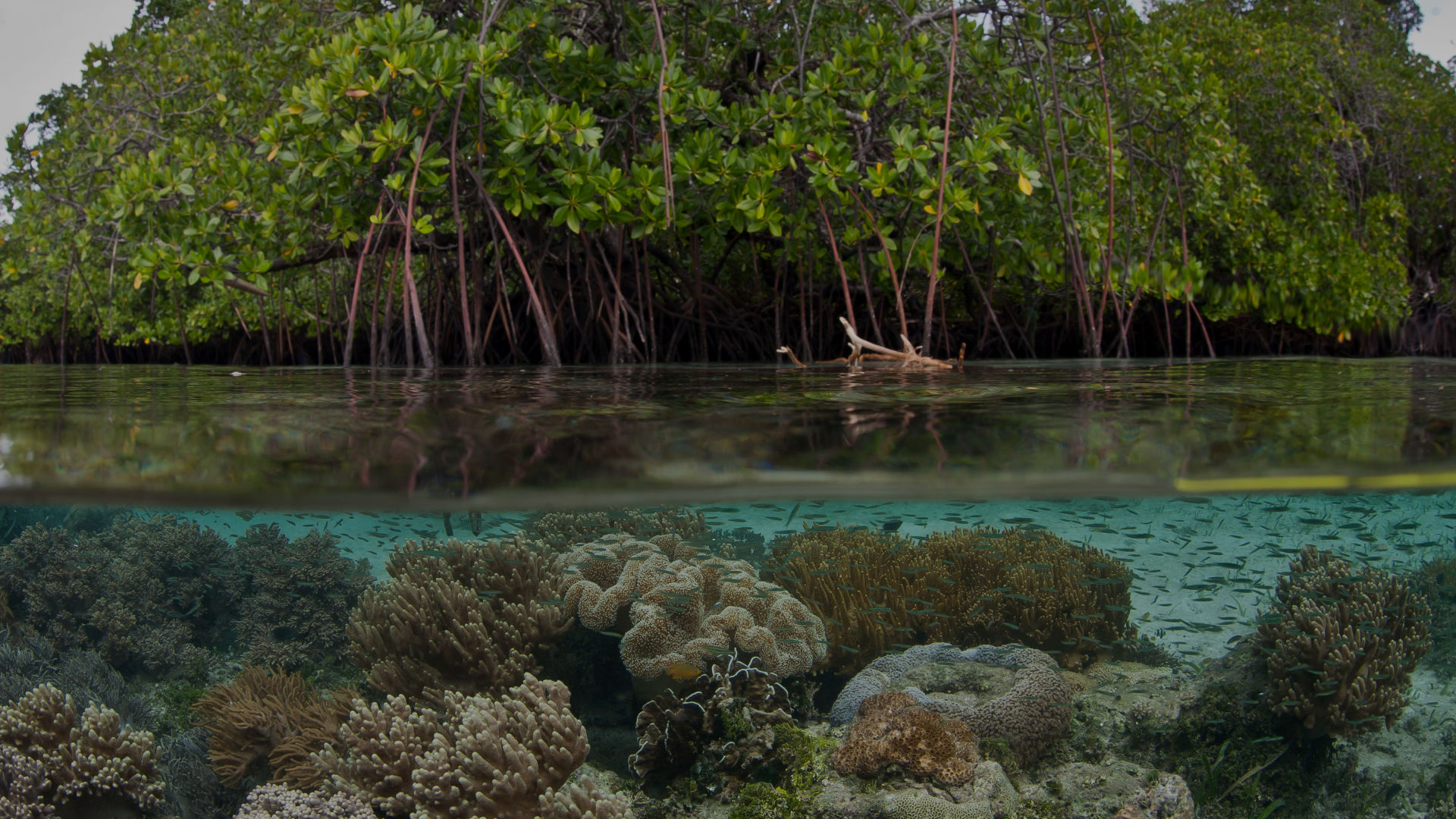
Local Action Projects
Across the Reef and catchments, everyday heroes are bringing their local knowledge, ideas and networks to care for the Reef. Local action projects engage communities in delivering a range of practical local solutions to Reef threats.
#Connecting local actions
Local action projects tap into local knowledge and networks to deliver practical local action to build Reef and community resilience.
Projects have been informed and championed by the network of 11 Local Marine Advisory Committees (LMACs) spanning the Queensland coast. LMACs are voluntary community-based committees that advise the Great Barrier Reef Marine Park Authority on issues at a local level. Their members bring local Reef leadership, representing a diverse range of expertise, experience and interests. Projects are delivered by a range of experienced local partners.
To date, 19 local action projects collectively supported and enhanced community capacity to address local Reef threats, with three key focus areas:
- Catchment and waterway protection
- Habitat rehabilitation
- Litter and marine debris source reduction.
We’re now exploring ways to grow collective impact approaches for community-led climate action across the Reef.
#At a glance
Collectively, from 2019-2021, these projects brought together 168 partners from Cape York to Bundaberg to deliver a range of locally-driven initiatives.
97
Education, outreach, and training activities to empower community participation and capacity
5,081
Local community participants contributing to projects on-ground
44
On-ground field days to collect data to protect the Reef and catchments
20
Examples of community data used to inform Reef planning, reporting and management actions
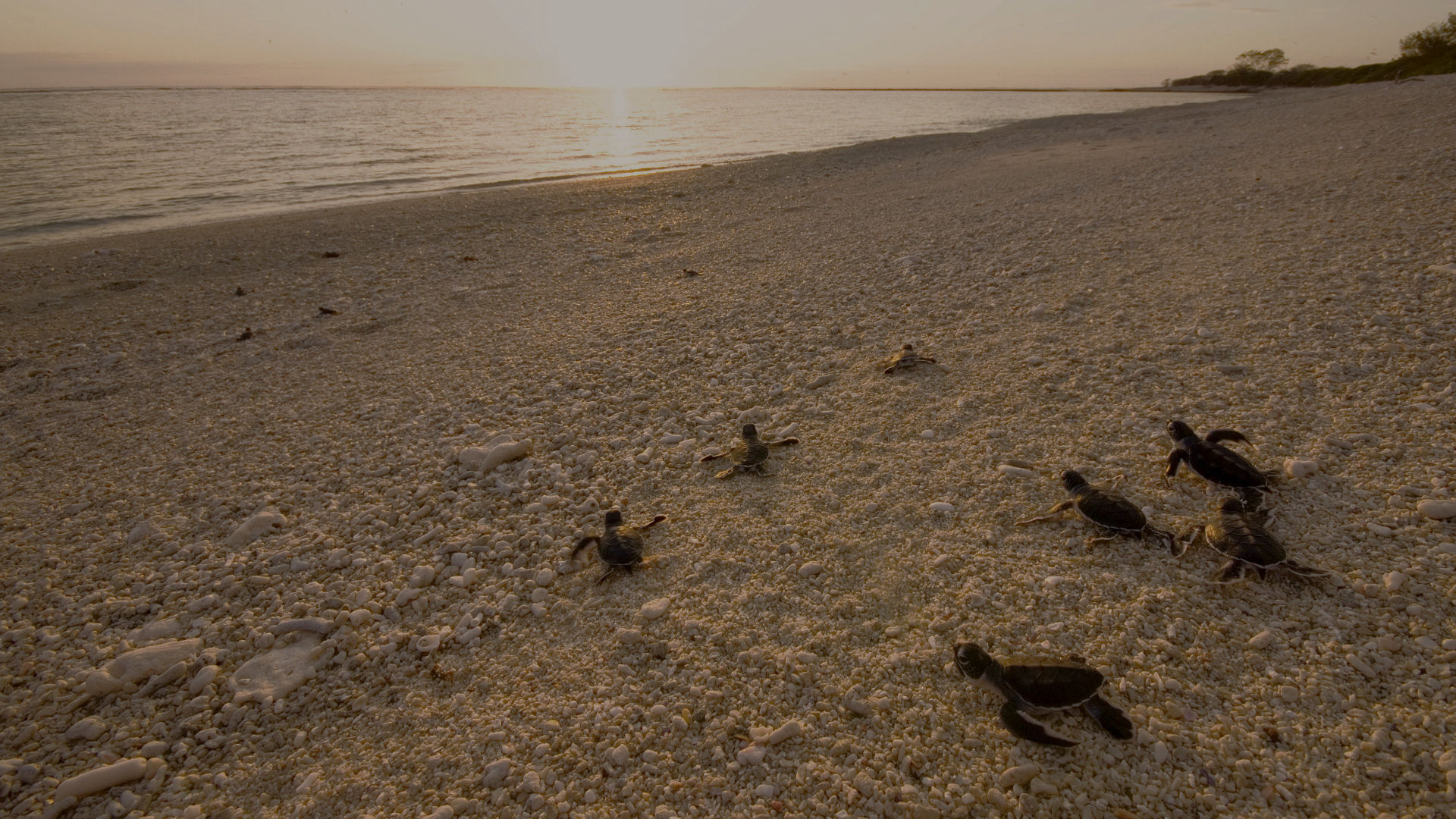
#Why local action?
Because local actions collectively contribute to change.
Protecting and improving the health and future trajectory of reefs will require a suite of actions at multiple scales. Collaborative community led action, informed by local knowledge has a valuable role to play in building local Reef and community resilience in the face of climate change.
Swift and significant national and international action to reduce climate change is critical. Community-driven mitigation actions can help to deliver measurable change at a local scale and contribute to empowering a broader movement.
Hand in hand with large-scale emissions reduction, local actions are important to both reduce pressures on habitats and wildlife, as well as to enable adaptation and restoration actions that help bridge the changes and challenges that we will continue to see.
These local actions also offer a range of social, cultural and economic benefits.
#Project impact areas
Local action projects 2019-2021 focused on delivering in three key areas, aligned with Reef 2050 Plan objectives.
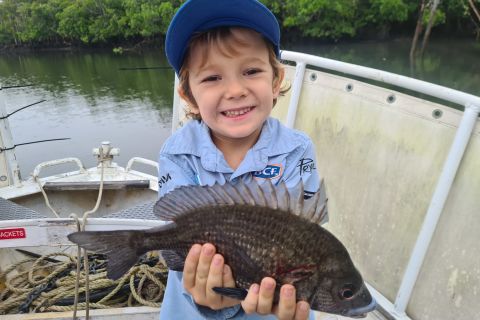
Catchment and waterway protection
Four projects across northern and central Queensland addressed local threats to catchments and waterways through building community capacity. Each of these projects utilised a collaboratively designed approach to enable tailored action in the local community. Collectively, more than a thousand participants were engaged in their activities through training activities, events, education campaigns, collaborative planning and mentoring activities. These projects have left a legacy through building the capacity of community groups and their partners to continue to protect catchments and waterways and by increasing understanding and awareness of these important ecosystems.
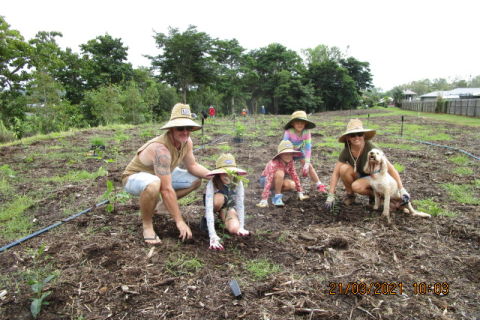
Habitat rehabilitation
Three local action projects across northern and central Queensland have protected the Reef through restoring riparian corridors, repairing an urban drainage system, and improving fish habitat and connectivity. Habitat rehabilitation in coastal ecosystems enhances biodiversity, traps carbon, and improves the quality of local waterways flowing into the Reef. Collectively, these projects have removed weeds, and planted 3,170 plants, across 2.5 hectares. 237 people participated in these activities including local schools and Traditional Owners. The sites will continue to be monitored, maintained and improved by the community groups and their partners to further reduce impacts on local Reef waterways, increase biodiversity and offer great community use benefits.
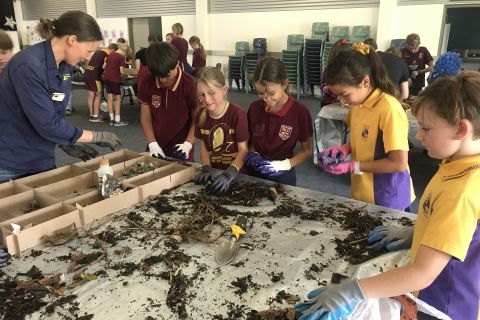
Litter and Marine Debris Source Reduction
Four projects across central and southern Queensland tackled litter at its source through collecting rubbish in stormwater traps, entering the data into the Australian Marine Debris Database and creating source reduction plans. One project focused on initiatives to empower individual and community changes to simple sustainable behaviours to reduce plastic use. Collectively, projects have prevented over 260,000 items weighing over 3,500kg from potentially becoming marine debris on the Reef. Beyond those tangible outcomes, projects have left a legacy of ongoing actions, through source reduction plans, ongoing community activities and some projects securing external funding to continue and grow the work.
#Local Action projects
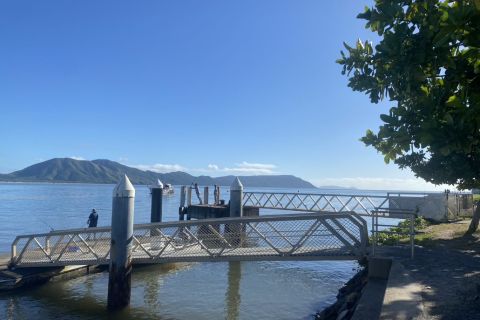
Cape York Reef Visitors Interpretive Signage
South Cape York Catchments, supported by Cape York Local Marine Advisory Committee and project partners developed a collaborative behaviour-change project to increase awareness and encourage visitors to minimise their impacts on the environment.
“This project has given Cape York Traditional Owners, land managers, and community the opportunity to come together with Government departments, Shire Council, and a Behaviour Change Social Scientist to discuss the new issues we are all facing and make plans for the future. We have forged new relationships and partnerships, which will hopefully assist all of us to meet the challenges that arise as many more people come to visit our extraordinary backyard - Cape York and the Northern Great Barrier Reef.” - Jessie Price-Decle, South Cape York Catchments
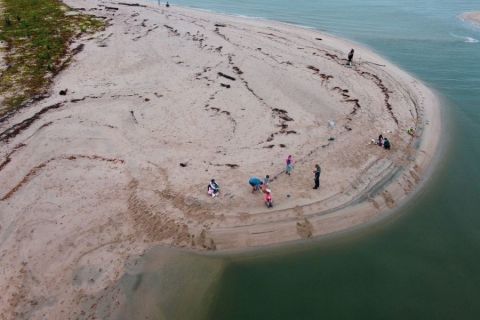
Fishing for the Future
Douglas Shire Council, supported by the Douglas Local Marine Advisory Committee and project partners, brought the Port Douglas community together to re-imagine a sustainable fishing strategy that encourages both locals and tourists to help protect the Reef through more sustainable fishing and boating practices.
“We are at a critical point for taking action, and we need a collective effort to see real change. The Strategy and Action plan provide a framework for the community to plan their fishing future on their terms.” - Phil Laycock, Marine Biologist
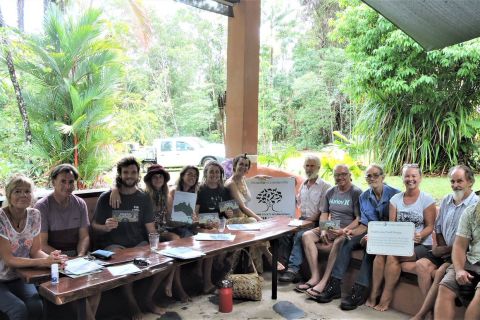
Warriors of the Waterways
Cairns and Far North Environment Centre, supported by the Cairns Local Marine Advisory Committee, designed a targeted community organisation and leadership program. The program was then piloted with three community groups to strengthen their capacity to empower community to take local action in protecting urban waterways.
“We have begun to use the tools and are working on better and timely communication, including working toward a regular newsletter. We are working on developing a database for records, and some of us have done further training with Mailchimp. This would not be possible without the help of the core trainers at the workshop.” - Maree Treadwell-Kerr
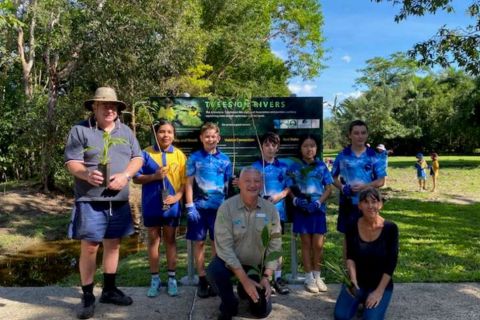
Community rehabilitate Warrina Lakes
Johnstone River Catchment Management Association, supported by the Cassowary Coast Local Marine Advisory Committee and a range of project partners, rehabilitated two sections of Warrina Lakes by improving the hydrology, revegetating and stabilising the banks to stop sediments and nutrients flowing into local waterways and out to the Reef.
“Flying Fish State School students have adopted this project and over time will continue to nurture and monitor this wetland site as part of their school activities. We are always excited to be educating the younger generation and helping them ‘get their hands dirty’ to improve the natural landscape in our region.’’ - Errol Colman, JRMCA Coordinator.
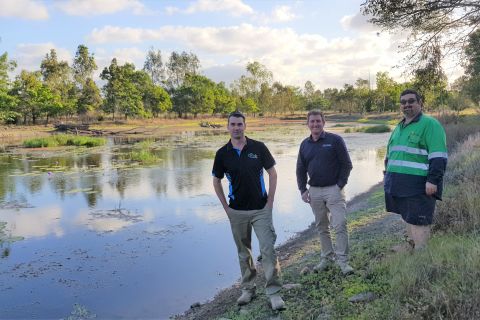
Fishway in the Lower Herbert
OzFish Unlimited, supported by the Hinchinbrook Local Marine Advisory Committee and project partners, are working with the community to collect baseline citizen science data and to design a fishway that will improve habitat connectivity for fish migrating from the Reef to freshwater for feeding and spawning.
“The Hinchinbrook LMAC identified an issue where overflow from the Herbert River and localised rain fills up a water way adjacent to the Tyto wetlands. Fish move up through the flooded waterway but hit a barrier before entering the wetlands and can’t go any further. We’re working with OzFish to scope this out and hopefully it’ll lead to more funding for a passageway.” - Adam Royle, Hinchinbrook LMAC member
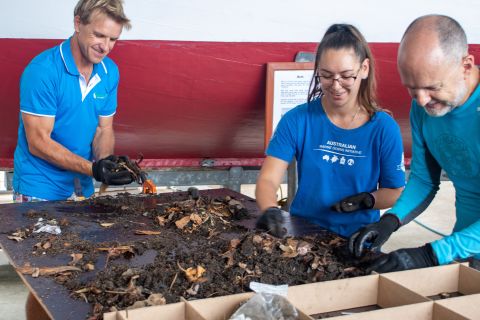
Strain the Drains Townsville
Townsville City Council, supported by Townsville Local Marine Advisory Committee and project partners, led the Townsville Urban Marine Debris Strategy to install and audit litter traps that inform Reef Clean source reduction plans to address hotspot areas found along Ross Creek.
“Stormwater litter baskets installed during the Strain the Drains Townsville project have provided an enduring legacy through the continued diversion of litter from Ross Creek and our nearshore environment in Townsville. The auditing period provided valuable insights into the maintenance frequency required of assets in this location.” - Alana Lorimer, Townsville City Council Acting Coordinator Sustainable Water Senior Officer Creek to Coral
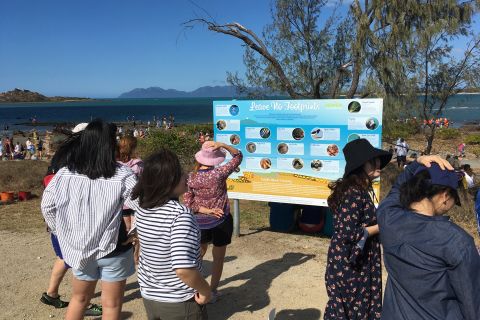
Leaving No Footprints
In 2019 – 2020, Bowen Tourism and Business supported by the Bowen Burdekin Local Marine Advisory Committee and project partners engaged local community members in an education campaign to protect local fringing reefs in Bowen at the Walk to the Lighthouse community event and through a school education program.
“Students felt a real sense of being valued due to their research being used for the public signage. Students also developed their own deep understanding of the ecology of a number of local species and the coastal shoreline generally.” - Bree Ross, Head of Department, Science, Bowen State High School
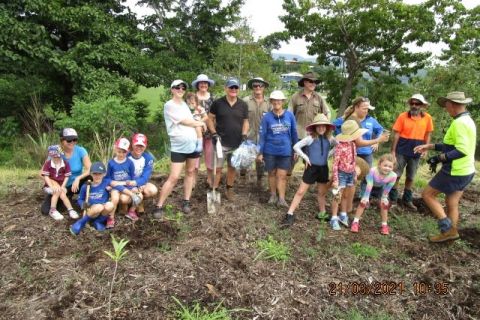
Twin Creek Restoration Project
Whitsunday Regional Council, supported by Whitsunday Local Marine Advisory Committee and project partners, restored a degraded urban creek to improve a riparian corridor for local wildlife and improve the health of local waterways connected to the Reef.
“I'm really proud of the community effort with the number of different organisations including Landcare, Council, Whitsunday LMAC, GBRF and Reef Catchments all working together to plant trees, to restore the river banks and lead to better water quality on the Reef” - Al Grundy, Councilor Whitsunday Regional Council
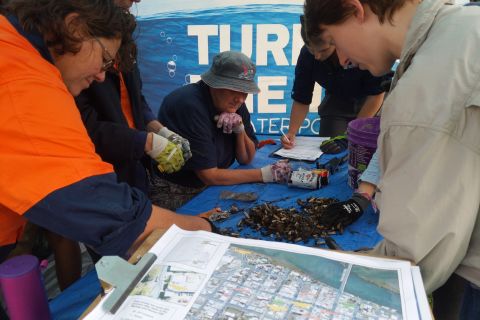
Tackling cigarette butt litter at the source
Reef Catchments, supported by the Mackay Local Marine Advisory Committee, led a community behaviour change program to reduce a commonly found litter item in coastal and waterway surveys - aiming to reduce cigarette butt litter from cars.
“No one has really tried targeting cigarette butt litter from cars before. This project was novel, exciting and hopefully just the start of our focus on reducing cigarette litter.” - Cass Hayward, Reef Catchments Catchments Conservation and Communities Senior Project Officer

What's down our drains?
Fitzroy Basin Association, supported by the Capricorn Coast and Gladstone Local Marine Advisory Committees and project partners, reduced litter and marine debris sources through the development of source reduction strategies using community data and leading to communications and behaviour change campaigns in Rockhampton, Yeppoon and Gladstone.
“This project demonstrates an upstream solution to a downstream problem. It’s exciting as it gives us a better understanding of human behavior and allows us to measure the success of our work in real-time – and we’re seeing results.’’ - Bethlea Bell, Fitzroy Basin Association’s Community Partnership Officer
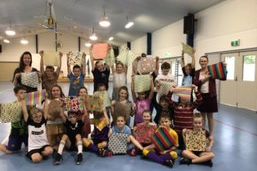
Less is More for the GBR
Bundaberg Fruit and Vegetable Growers Cooperative, supported by the Burnett Local Marine Advisory Committee and project partners, worked to inspire schools, business and individuals across the region to tackle single use plastic through switching to paper straws, running beeswax wraps train the trainer workshops and installing a water bottle refill station.
“When we grab a plastic straw, wrap sandwiches in clingwrap or even grab a plastic water bottle, we don’t think about the long-term impacts that decision has, with those plastics persisting for hundreds of years in our environment. It’s time to break some of those habits and think about how we want the world to look like in the future.” - Sue Sargent, Project Lead
#Highlights & learnings
Strengthened sharing across litter reduction projects by connecting project leads, and identifying a broader interest in sharing and communications across regions
Identified an emerging interest in community-led sustainable fishing strategies and actions across multiple regions
Improved understanding of collective impact opportunities across the Reef, with strong interest in community-led climate action raised across regions
Demonstrated strong participation and interest from local councils in delivering and enabling projects with their communities (16 of 19 projects with Council as lead or a partner)
#What's next?
This feedback continues to shape a new program model for the future round of grants to launch in 2023, responding to identified opportunities and enabling a themed collective impact approach focused on climate action.
#Latest news
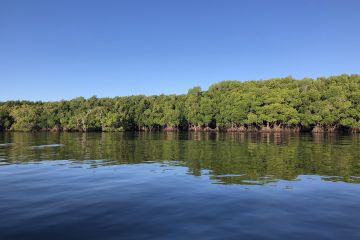
Project News ·
Empowered communities care for mangroves in Queensland
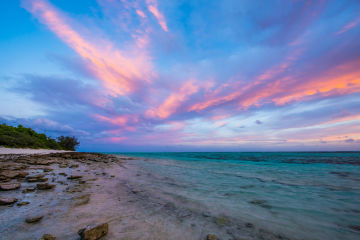
Project News ·
Local Action Projects design case study
Pilot program design, achievements and learnings 2019-2022
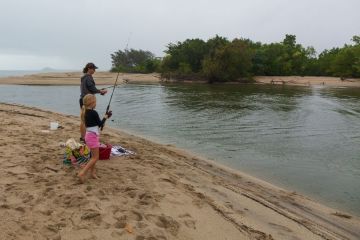
Project News ·
Local Action project wrap: Stories of impact Douglas Shire
Fishing for the future: Promotion of Sustainable Fishing Practices
